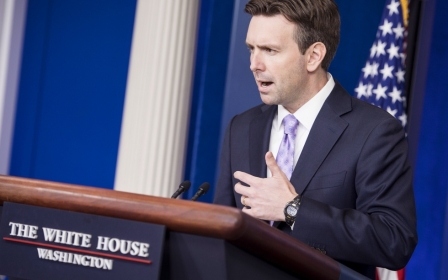The language of 'evil' doesn't help us defeat IS

The horrifying beheading of British aid worker David Haines by the so-called Islamic State (IS) militants, and the spectre of future executions following the release of a video featuring journalist John Cantlie has once again shone the spotlight on IS’s violent tactics. Although the latest video seems to reflect a shift in strategy with Cantlie appearing alone, without the presence of an IS figure threatening him, his fate may ultimately prove no less brutal. Indeed the group has come to be associated with extreme acts of violence against both local populations and foreign nationals living in the region.
In a tweet, British Prime Minister David Cameron referred to Haynes’ murder "an act of pure evil" and described IS as "monsters". But how helpful to our understanding of IS is it to label their actions using cosmic references to wickedness, and how effective can our response be if we fail to assess violence as a deliberate strategy?
IS’s staged approach to its executions – set, scripted, filmed and edited – suggests the group revel in their brutal image. They feed off the shock which their carefully choreographed actions engender and the horror they elicit only fuels their sense of power. After all, the way they like to depict their captives, dressed in the sort of orange jumpsuits we’re more used to seeing on Guantanamo detainees, reflects precisely the sort of power relations they are seeking to present – the tables are turned they are saying, we are the super-power now, it is your citizens whom we will do with as we please.
But it is precisely because of the group’s efforts to manage its image as a seemingly well organised, fully functioning state, with PR machine to boot, that we must be attentive not to readily accept their crafted appearance. In fact, according to French security specialist Alain Chouet, IS could well struggle to manage the territory it has conquered due to a lack of both manpower and funds, a much needed depiction of the group’s real, rather than overstated capabilities, which redresses some of the often unwitting hype created around the group. Just because IS controls territory the size of the UK, doesn’t mean the group can or should be regarded as a state or even entity of any equivalence. To quote the Arab academic Nazih Ayubi, referring to the region’s actual, existing states, "the real power, efficacy and significance of this state might have been overestimated." The same is true but to a far greater extent concerning IS. A state suggests elements of legitimacy and consent wholly absent from this group’s engagement with local populations. To accept their self-declared status as a state is to implicitly accept their claim to representation, yet again favouring unrepresentative political pretenders over the drowned out voice of the people.
IS want to be perceived as a threat significant enough to be treated as an "equal" by Western states, and this is precisely why using the language of state actors, such as when both the White House and the Pentagon described the United States as "at war" with the group, only serves to reinforce the group’s mystique. In not adequately challenging IS’s narrative as an equal interlocutor, a rival "state", we risk allowing the videos of these beheadings to become what the images of the fall of the Twin towers were for Al Qaeda, a victory totem and a rallying call to a group which seeks to build its support on an image of an 'alternative utopia' resisting Western might.
France recently announced it would no longer refer to the group by its chosen name, but by the derogatory term "Daesh", partly to challenge precisely this narrative. French Foreign Minister Laurent Fabius declared: "This is a terrorist group and not a state. (…) The Arabs call it 'Daesh' and I will be calling them the 'Daesh cutthroats'."
In so doing, the French have actively rejected the group’s rebranding as "the Islamic State" and the concomitant attempt to lay claim to grandeur of Muslim empires by a guerrilla group who as Professor Fawaz Gerges from the LSE points outs, "actually stresses violent action over theology and theory, and has produced no repertoire of ideas to sustain and nourish its social base." In fact, violence is central to the group’s strategy. Fawaz describes the violence as a rational choice, arguing that it represents a "conscious decision to terrorise enemies and impress and co-opt new recruits." That is to say there is a logic behind the use of extreme violence. A logic which belies notions of an ahistorical "evil".
When we refuse to see the perpetrators of violence as anything more than moral renegades, we risk overlooking the ways in which violence has in fact been not only key to the construction of the modern state, but central in fact to the very narrative of progress. Clearly, not all violence is equal. We accept the necessity of violence when we attribute it to a higher moral cause, but deem it senseless if the violence doesn’t fit our own narrative of progress. In the case of IS, understanding what motivates their belief in "violence as progress" is central to defeating them.
The violence meted out by IS today is itself happening in a region which has experienced the killing of hundreds of thousands of civilians over the last decade: over 200, 000 in Syria in the last three years alone, and hundreds of thousands more in Iraq before that. In both cases, extreme violence has been justified in order to either midwife or 'protect' the modern state, and to advance given ideals, of nationalism or democracy-promotion.
Understanding that IS’s violence has emerged from the overlap of two of the deadliest conflicts in the region is to realise that the group represents a continuation of local aspirations for self-governance in a context where violence has been the language of power and rule. While modern democracies evolve non-violent methods for ensuring public acquiescence, linking participatory initiatives to political success, in the region IS currently occupies, despite attempts a democratic process, brute violence has been the mark of the successful ruler. What’s more, their methods - crucifixions, beheadings and other forms of cruelty have become increasingly common among other, less high profile groups, whose exclusively Arab and Muslim targets make for less prominent headlines.
Despite the temptation to view IS as Al-Qaeda 4.0, a more accurate representation would be the apogee of the guerrilla groups which have come to over-run the failed states in the region. Unlike Al-Qaeda’s 'transnational Jihad', IS’s focus is state building in Syria and Iraq. While for Al-Qaeda, the main impediment to Muslim autonomy was Western meddling, rendering the West a target, IS’s main focus has been local targets they deem as "enemies".
The focus on "evil Islamists" might be a useful bogeyman against which to rally public support, but it fails to understand IS’s violence either as a strategy to intimidate its opponents and inflate its weight, or as part of its internalised repertoire of state building.
Defeating them can’t possibly come through inflicting yet more violence on a battered region, nor in the form of Obama’s coalition of Western military interventionism teamed with notoriously repressive autocracies. The tried and hardly successful recipe, is unlikely to provide the necessary elements for a counter to the narrative of violence which has gained strength in the wake of the demise of the Arab uprisings, a narrative which claims political routes are ineffective and violence alone can build an independent Arab state. Ultimately, there is only one long term solution - a genuine process of inclusive state-building. Without it, the trumped up claims of impostor groups like IS seem far more convincing than they truly are.
-Myriam Francois-Cerrah is a Franco-British journalist, broadcaster and writer with a focus on current affairs, France and the Middle East.
The views expressed in this article belong to the author and do not necessarily reflect the editorial policy of Middle East Eye.
Photo: Militants from the group Islamic State (AFP PHOTO/HO/AL-FURQAN MEDIA)
Stay informed with MEE's newsletters
Sign up to get the latest alerts, insights and analysis, starting with Turkey Unpacked
Middle East Eye delivers independent and unrivalled coverage and analysis of the Middle East, North Africa and beyond. To learn more about republishing this content and the associated fees, please fill out this form. More about MEE can be found here.





